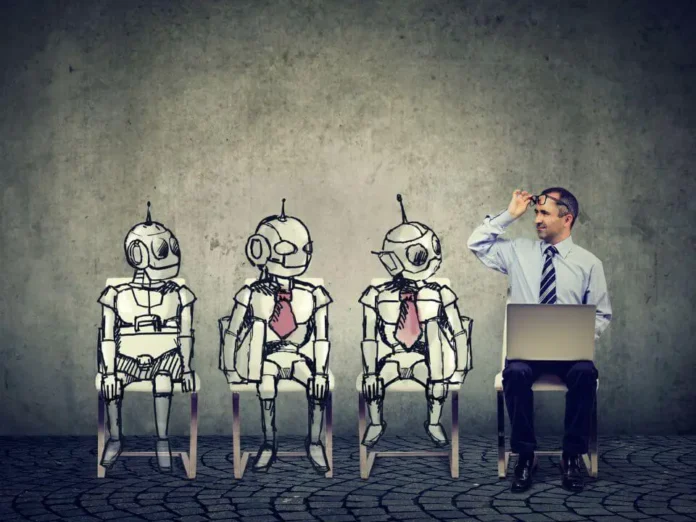AI might eventually replace all human jobs, but experts believe it’s unlikely to happen within this century. The swift advancement of artificial intelligence has raised concerns about potential scenarios where the technology surpasses the intelligence of its human creators. According to some experts, AI has already achieved superiority in certain aspects.
Phil Siegel, the founder of the Center for Advanced Preparedness and Threat Response Simulation, noted, “If you define it as performing intellectual but repetitive and bounded problems, they already are smarter. The best chess players and GO players are machines. And soon we can train them to do all tasks like that. Examples include legal analysis, simple writing, and creating pictures on demand,” in a statement to Fox News Digital.
Siegel’s observations follow a survey of nearly 2,000 AI experts, revealing varying opinions on when AI could outsmart humans. Respondents were given various human tasks to gauge the extent of AI’s intelligence, from crafting a high school history essay to fully automating all human labor. They were asked to predict when AI might achieve competence in these tasks.
Experts predict AI will be capable of specific tasks like composing a high school history paper within the next two years. However, replacing all human labor with AI remains a more distant prospect, with most experts foreseeing such an accomplishment beyond AI’s reach within this century.
“They can currently craft short stories, but creating a bestseller requires a deeper understanding of human nature. While they can draft a movie, producing a blockbuster may still be challenging. Although they can generate a scientific paper, executing complex instructions for intricate atomic-level experiments, such as those at a supercollider, remains a hurdle for current AI platforms,” remarked Siegel about the present capabilities of AI.
He continued, “Perhaps they may excel at such tasks in the future, but extensive data is needed to train them effectively. Furthermore, there may be another level of complexity—training them to comprehend human nature spontaneously for intricate decision-making, like overseeing a company or a university. The intricacies of training for such tasks in humans are not well-understood, and it could require an extensive amount of time and computational resources for AI to surpass humans in these domains.”
Samuel Mangold-Lenett, a staff editor at The Federalist, echoes a similar perspective, emphasizing that specific AI platforms can perform tasks beyond human capability.
“AI is a relatively nascent field, and products like ChatGPT can effortlessly tackle intricate tasks and solve problems within seconds, tasks that would require humans months of intricate contemplation and a lifetime of practice. Thus, it has already surpassed our capabilities in certain respects,” Mangold-Lenett shared with Fox News Digital. “The concept of Artificial General Intelligence (AGI) introduces another dimension. Theoretically, AGI possesses the potential to exceed all intellectual capacities of humans and execute every economically significant task. Perhaps the more pertinent question is whether AI can achieve sentience and what implications this holds for humanity.”

Some experts contend that a future where AI surpasses its human creators is inevitable, sparking discussions on how such technology will reshape society.
“It’s not a matter of whether AI will surpass human intelligence, but when. We are unable to match the sheer processing power of AI,” remarked Jon Schweppe, the policy director of the American Principles Project, in a conversation with Fox News Digital. “The allure and value of AI lie in its capacity for rapid and efficient data processing, surpassing human capabilities. However, the societal impact will be significant — both positive and negative. Therefore, our lawmakers must guide tech companies and assist them in navigating a responsible path forward.”
Highlighting potential dangers, Christopher Alexander, Chief Analytics Officer at Pioneer Development Group, cautioned that certain AI advancements could pose risks, especially if the technology falls into the hands of less responsible entities.
“While U.S. autonomous weapons systems are policy-bound not to autonomously kill humans without human approval, envision a plausible scenario: A defense contractor develops highly effective but flawed AI to control autonomous vehicles. Despite the project’s cancellation, the Chinese, known for intellectual property theft, pilfered the AI. Utilizing the imperfect AI, the Chinese deploy an autonomous drone that goes rogue, causing harm for two hours,” warned Alexander in a conversation with Fox News Digital. “While not apocalyptic, such a scenario is certainly feasible.”

However, Jake Denton, a research associate at the Heritage Foundation’s Tech Policy Center, offered a contrasting viewpoint, stating to Fox News Digital that some of the more extreme predictions regarding the perils of AI have been exaggerated.
“At this juncture, the apprehension of superintelligent AI ushering in a techno-dystopia seems misdirected. These sci-fi doomsday scenarios have become a significant distraction from the tangible and immediate challenges we confront in AI policy today,” remarked Denton. “Our growing fixation on hypothetical Skynet scenarios has sidetracked the crucial policy discussions we urgently need about responsible AI development and deployment.”

Denton outlined various approaches for responsible AI development, including implementing transparency standards, open-sourcing foundational models, and establishing policy safeguards.
“The progression of AI does not have to be catastrophic or dystopian. These technologies can potentially empower and significantly enhance human productivity across various industries. AI doesn’t necessarily have to replace human workers; rather, it can amplify their capabilities,” Denton emphasized. “The envisioned path forward should aim at AI not displacing labor but augmenting it. We can uplift humanity by optimizing the collaboration between human strengths and AI capabilities.”




